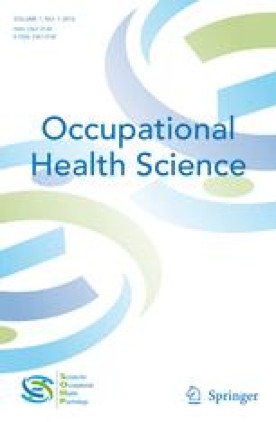- 充值
- 帮助

This peer-reviewed journal is dedicated to presenting leading edge scholarship on behavioral, social, and psychological aspects of occupational health. The journal publishes papers that represent important empirical and/or theoretical contributions to our understanding of phenomena related to worker safety, health, and well-being. The journal combines a multidisciplinary orientation, an international perspective, a translational/evidence-based practice focus, and a flexible approach that welcomes both deductive and inductive articles. Please note that the journal does not publish purely descriptive research and that all contributions should demonstrate how they extend prior literature on behavioral and social factors in the workplace. The contents include articles of interest to academics as well as practitioners in applied psychology, public health, industrial hygiene, occupational medicine, nursing, occupational safety, epidemiology, ergonomics, human resource management, organizational behavior, sociology, and economics. Journal Scope: This journal primarily considers empirical and theoretical investigations that enhance understanding of phenomena related to worker safety, health, and well-being. Below is a list of sample topics that are covered by the journal (this list is based on the topic list of the APA/NIOSH Work Stress and Health conference: www.apa.org/wsh). Submissions on other topics related to the major aims of Occupational Health Science also will be accepted. 1. Occupational Stress. Environmental and individual factors that contribute to the stress process; moderators of stress-outcome relationships. 2. Economic Factors and Occupational Health (e.g., job insecurity, unemployment, income disparity, and financial stress). 3. Occupational Health Interventions: Organizational, individual, social policy level, and multilevel interventions; health promotion; integrated safety & health programs, cost-benefit analyses of occupational health interventions 4. Workplace Diversity and Discrimination: Minority and Immigrant Workers, Age/Gender/Race/Ethnicity/Disability Discrimination, Occupational Health Disparities. 5. Workplace Aggression: prevalence, antecedents, and consequences of physical/verbal violence, harassment, bullying, incivility – prevalence, antecedents. 6. The Employment Relationship: Contract and temporary work; Self-employment; Seasonal Work; Under- and over-employment; unemployment; job insecurity. 7. Work Schedules: Part-time work; Night/evening work; Weekend schedules; irregular schedules; overtime; long work hours; flexible schedules; telecommuting. 8. Human Resource Management and Benefits: Health, pension, and other benefits; FMLA issues, Pay equity; Workers’ compensation program issues; job accommodations. 9. Work, Life, and Family: Work-life balance; Work-family conflict; Child and dependent care; Formal and informal family supports; Positive spillover. 10. Organizational Practices: Lean production; Downsizing and resizing; Globalization; Outsourcing; Continuous improvement; Process reengineering; Emerging technologies. 11. Job and Task Design: Worker control; Work pace and work overload; Emotional labor; Physical demands. 12. Social and Organizational Context: Organizational climate and culture; Social support; Supervision and leadership; Group dynamics; Communication. 13. High Risk Jobs and Populations: Younger and older workers; Hazardous work environments; High-risk occupations. 14. Traumatic Stress and Resilience: Assessment, prevention, mitigation, and treatment of traumatic stress; Resilience; PTSD; Treatment seeking. 15. Mental and Physical Health consequences of Job Stress: Depression, Obesity, Substance abuse, Musculoskeletal, cardiovascular, and immune system function; Suicide. 16. Sleep, Fatigue, and Work: Effects of work schedules on sleep; Sleep disorders and medications; Health and productivity implications of sleep disruptions. 17. Aging and Work Stress: Job design for aging workers, Attitudes toward aging workers; Disability management and accommodations; Health benefit implications. 18. Health Services and Health and Productivity Management: Employee Assistance Programs; Vocational rehabilitation & counseling; Disability management. 19. Organizational Climate, Management & Training: Safety communication motivation and leadership, hazard identification and elimination, safety climate and culture, other specific aspects of climate related to occupational health (e.g., psychosocial safety, violence prevention, diversity, justice, family support). 20. Professional and Educational Development: Graduate/Undergraduate/Employee training in Occupational Health disciplines; Career development programs. 21. Research Methodology: Innovations in occupational health research design, measurement, methodology. 22. Prevention / Intervention Methods and Processes: Field intervention design, barriers, and challenges; Intervention evaluation/implementation methods and standards. 23. Positive Aspects of Well-being. Job satisfaction, work engagement, job involvement, positive work experiences, benefit finding. 24. Individual Differences in Occupational Health: personality, coping skills, demographic factors affecting occupational health outcomes. 25. Occupational health and employee retention: Health influences on turnover; Presenteeism; Absenteeism; Commitment; Organizational citizenship behaviors. 26. Rehabilitation and accommodation for disabilities: re-entry to the workplace after injury and illness; accommodation for workers with disabilities, especially those disabilities that were work-related. 27. Accidents and injuries: Environmental and individual factors related to workplace accidents and inj uries. 28. Musculoskeletal Disorders (MSD): Environmental and individual factors related to development of MSD. 29. Health promotion: The effectiveness of health promotion by organizations, for example, offering health programs for exercise or smoking cessation. 30. Dissemination and Implementation Science: Research approaches for translation of knowledge into practice, including identification of factors or methods affecting intervention adoption, scale up and sustainability. Research with international perspective, on all aspects of occupational health Delivers multidisciplinary scope through theory-based and descriptive articles Affiliated with the Society for Occupational Health Psychology
- 主办单位: SPRINGERNATURE
- 出版周期: 季刊
- 国际标准连续出版物号: ISSN 2367-0134
- 创刊时间: 2017年
-
vol.8 (2024)
vol.8 (2024)
-
vol.7 (2023)
vol.7 (2023)
-
vol.6 (2022)
vol.6 (2022)
-
vol.5 (2021)
vol.5 (2021)
-
vol.4 (2020)
vol.4 (2020)
-
vol.3 (2019)
vol.3 (2019)
-
vol.2 (2018)
vol.2 (2018)
04 03 02 01 -
vol.1 (2017)
vol.1 (2017)
不详

 分析评价
分析评价
